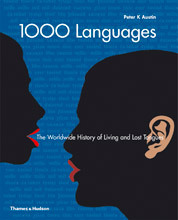I just received copies from the publishers of a new book that may be of interest to readers of this blog. It is called 1000 Languages: The Worldwide History of Living and Lost Tongues and is edited by yours truly. The book was published by Thames and Hudson in the UK and associated countries, and by University of California Press in the US. It is available on UK Amazon, or readers in the UK can get it for an even cheaper price via the Tesco on-line store.

The book is issued in hard cover and runs to over 300 pages and includes over 400 colour illustrations, a series of maps, a glossary of linguistic terms, and a list of references. It is organised topically by geographical regions and each chapter explores the sources, interrelationships and characteristics of that region’s languages, including the major and minor ones of the area. It includes chapters on the topical issues of endangered and extinct languages. Each main entry details numbers of speakers, geographical spread, growth, development and key features of the language. The following is a list of the chapters and authors:
Introduction — Peter K. Austin
World Languages — Nicholas Ostler
Europe — Glanville Price
West and North Africa — Phil Jaggar and Friederike Luepke
Central, East and Southern Africa — Nancy Kula and Lutz Marten
South Asia — Anju Saxena
Central, Western and Northern Asia — Kagan Arik
East and South East Asia — David Bradley
Pacific and Australia — Nick Thieberger and Rachel Nordlinger
North, Central and South America — Nicholas Ostler and Jose Antonio Flores Farfan [.pdf]
Endangered Languages — Lenore Grenoble
Extinct Languages — Nicholas Ostler
According to Andrew Robinson’s review on page 55 of the 18th June 2008 issue of New Scientist, “for anyone fascinated by the diversity of the world’s rapidly vanishing languages, here is an account to relish”. Robinson’s review says the book is “an authoritative and copiously illustrated global survey” and concludes that “1000 Languages is an accessible and fascinating reference source, ideal for polyglot dipping”
I guess I’m biased but I think it would make an ideal book for friends, relatives and students interested in an accurate and accessible account of the diversity of the world’s languages.
 Follow
Follow
Cool! Hopefully it can provide us with a whole bunch of more meaningful factoids to illustrate the severity of language endangerment than The Linguists‘ “Every two weeks, one of the world’s 7000 languages becomes extinct”. True as it may well be (though I question the thoroughness of their research) hearing it so often makes me cringe.
In fact Peter, off the top of your head, are there any such factoids that we as a profession can start propagating throughout the media?
Just got the book – looks great. Well done, Peter et al., but can I suggest you include something on signed languages for the second edition? 🙂
Thanks for your comment Jangari – well you’ll just have to buy the book 🙂
Actually we are planning to build a website for the book and I have arranged for my introduction to be available there. I will also try to get the publishers to agree to make Lenore Grenoble’s Endangered Languages chapter available too. Lots of factoids there.
Adam, point taken about sign languages – we really should have had a separate chapter on them and discussed them and their worldwide distribution. As you say, we can look at this for the next edition, so keep buying those books folks!
Here is a discussion of the book for our Italian readers from the Centre for the Documentation of Minority Peoples:
L’editoria anglofona continua a occuparsi intensamente dei problemi linguistici, e in partico-lare degli idiomi che rischiano l’estinzione. Dopo i libri pubblilcati negli anni scorsi, fra i quali ricordiamo quelli di David Crystal, Christopher Moseley e Nicholas Ostler, è la volta di un’opera molto interessante, intitolata 1000 Languages: The Worldwide History of Living and Lost Tongues. Anche stavolta l’autore è un esperto prestigioso: si tratta di Peter K. Austin, direttore dell’Endangered Languages Academic Programme lanciato dalla School of Oriental and African Studies (SOAS) di Londra. Linguista prestigioso, Austin ha pubblicato saggi e libri che spaziano dalla linguistica comparativa alla storia degli Abiorigeni australiani.
In questo nuovo libro (Thames & Hudson, 288 pagine) lo studioso inglese approfondisce le origini delle lingue, le relazioni storiche che le legano, soffermadosi anche su quelle estinte e su quelle che rischani di scomparire. Riccamente illustrato, ricco dei numerosi riferimenti necessari per inquadrare correttamente la tematica, il volume rappresenta un importante strumento, utile per chiunque voglia approfondire questa materia complessa, affascinante e quanto mai attuale.